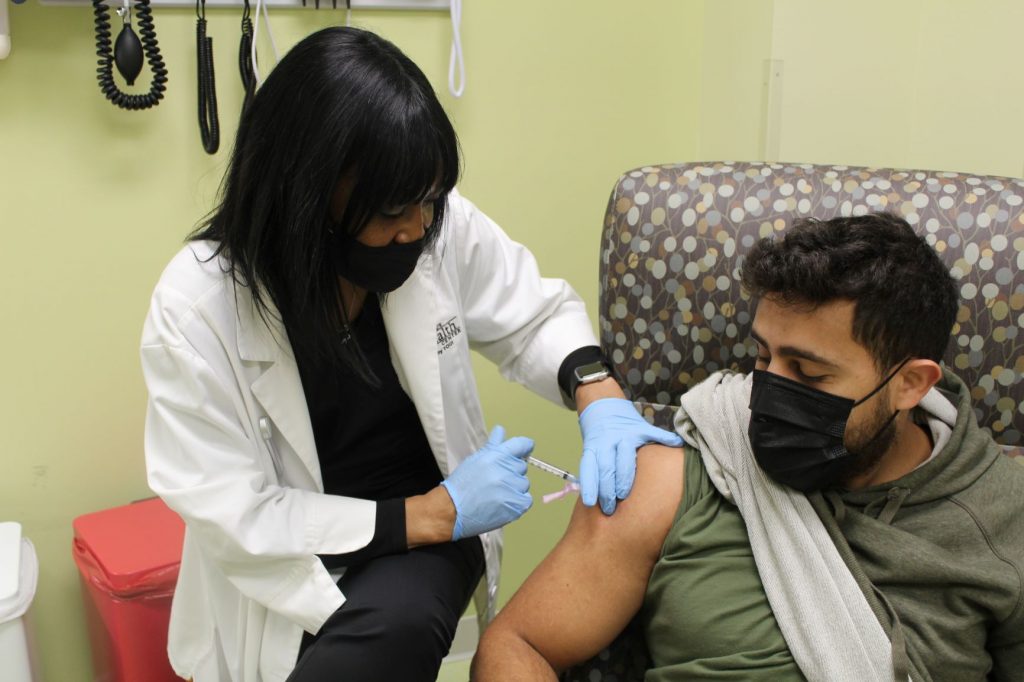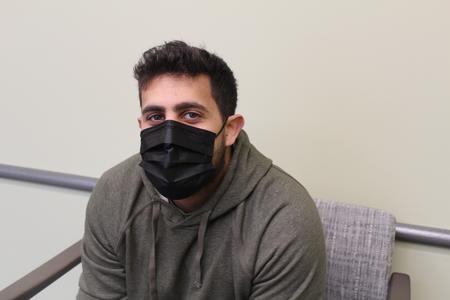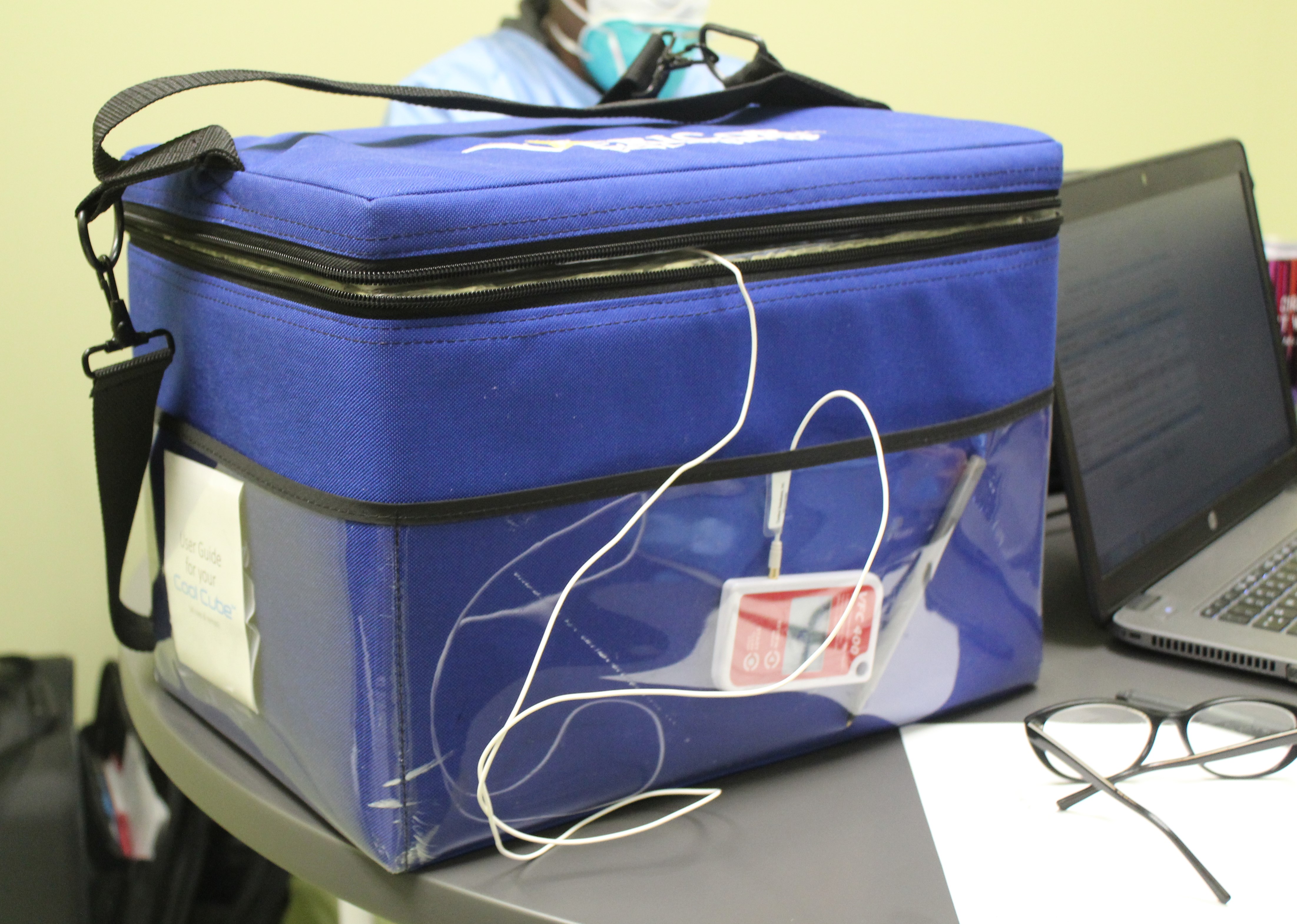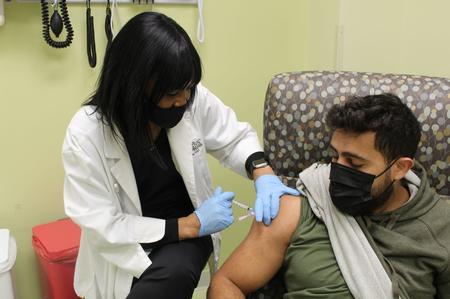What it’s Like to Get the COVID-19 Vaccine
Wayne State nursing student Mustapha Al-shorbaji shares his experience getting his shot.


Mustapha Al-shorbaji is a nursing student at Wayne State University. He sits in the lobby of the Campus Health Center with a black mask on, waiting to get a COVID-19 vaccine.
“As soon as I was presented the opportunity, I took the first appointment I could get to come here,” says Al-shorbaji.
Wayne State University began offering the vaccine to medical students and faculty with clinical rotations on January 7. That’s how Al-shorbaji found himself among the first people in the country to be given the chance to be inoculated against the coronavirus.
In addition to frontline health care workers, vaccinations throughout Michigan have been given to some people in long-term care facilities, police officers, bus drivers, K-12 teachers, postal workers, people over the age of 65 and others. Eligibility varies depending on where people live, work, or go to the doctor.
“The real information isn’t reaching the general public and that in itself is the problem.” — nursing student Mustapha Al-shorbaji
As of January 19, according to data from the Michigan Department of Health and Human Services, about 75,800 people in Michigan have received at least the first dose of the vaccine. In a state that’s estimated to have roughly 8 million people age 16 and up (according to the US Census Bureau’s American Community Survey), that means less than 1% of the population has been vaccinated.
WDET reporter Laura Herberg figured that the other 99% of the state’s population might be wondering what it will be like to get vaccinated. So, she followed as Mustapha Al-shorbaji waited get his shot.
Click on the audio player above to follow along as one young man gets his COVID-19 vaccine.
A Chill Vaccine
Al-shorbaji’s going to be getting a dose of the Moderna vaccine. Unlike its Pfizer counterpart, this one doesn’t need to be kept at -94 degrees Fahrenheit; it’s stored at -4 degrees but can last for about 30 days at higher temperatures.
The health center is storing 120 doses – the day’s allotment – in what looks like an oversized lunch box with a digital thermometer strapped to it.

“We check the temps every 30 minutes,” says Tonia Harvey, a medical assistant with the Detroit Health Department. She sits next to the cooler, inside a small room in the health center, writing temperatures onto a blank sheet of paper.
“We’re monitoring the current temp, minimum temp, and the maximum temp. So, we are documenting three temps every 30 minutes,” Harvey says.
Removed from long-term storage, the vaccine needs to stay between 36 and 46 degrees. Harvey says it’s currently at 41.7 degrees.
Back in the waiting room, Mustafa Al-shorbaji says he’s personally not worried about getting the vaccine, even though he’s seen a lot of alarming claims about it online.
“I go on social media a lot, being my age, and that’s literally all I see. It’s just propaganda and fear-mongering and all of this crazy stuff,” says Al-shorbaji. “The real information isn’t reaching the general public and that in itself is the problem.”
The Pfizer and Moderna vaccines don’t actually inject a small amount of COVID-19 into people. Instead, they teach the body’s cells to make a piece of a protein that triggers an immune response which then produces antibodies to fight the virus. The vaccines were made by leveraging technology that was in development to fight other diseases prior to COVID-19 which is how these vaccines were created so quickly.
Potential Side Effects
After waiting a little bit, Al-shorbaji is escorted back to one of the rooms. Dr. Toni Grant, the chief nursing officer at the campus health center, walks in wearing a mask.
“Have you read all the information that’s been provided for you?” Dr. Grant asks.
“Yes,” replies Al-shorbaji.
“And do you have any questions right now?” asks the doctor.
“At the moment? No,” says Al-shorbaji.
Dr. Grant then asks Al-shorbaji if he wants to move forward with the COVID-19 shot. He says yes. Then the doctor takes Al-shorbaji’s temperature and leaves to get the vaccine.
While waiting, Al-shorbaji fiddles with a paper packet in his hands.
“It’s the information and whatnot. Common side effects, helpful tips, and all of that stuff,” he explains.
Common reactions to the Pfizer and Moderna vaccines include headaches, arm pain, body aches, chills and fever. A small percentage of people in the vaccine trials, .01%, developed Bell’s palsy, a facial paralysis that is often temporary. Also, the Centers for Disease Control and Prevention says it’s received reports from health officials that less than .001% of people vaccinated had severe allergic reactions. For this reason, patients are instructed to wait for at least 15 minutes after their shot to make sure they don’t go into anaphylactic shock.
In terms of long-term health effects, medical professionals cannot yet say what will happen after someone has had the vaccine in their body for more than a year – because no one has yet. But researchers are continuing to monitor people who get vaccinated.

The Vaccination
Dr. Grant returns with the vaccine.
“Have you had time to think about everything?” she asks.
“Yes,” says Al-shorbaji.
“You still want to go ahead with it?” the doctor asks.
“Are you trying to scare me out of it?” Al-shorbaji asks with a chuckle.
“No, I just want to make sure we’re okay,” Dr. Grant says, smiling.
“Yeah, we’re good,” says Al-shorbaji.
Because he’s left-handed, Al-shorbaji wants to get the shot in his right arm, Dr. Grant’s first right-arm shot for the day. She puts on gloves and scoots next to him.
“So you want to know that it’s coming? You don’t want to know that it’s coming? You don’t care?” she asks.
“It doesn’t matter,” Al-shorbaji says. He’s not afraid of needles.
“Personally, I do not like needles so therefore I don’t want to know that it’s coming. You just want to talk to me and just let it happen and then it’s all over with,” says the doctor, while sneaking in the needle in, “You know?”
“That’s pretty smooth!” says Al-shorbaji, and they both laugh.
The Clock Is Ticking
Dr. Grant sets a timer for 15 minutes. Then tells Al-shorbaji that he’ll need to come back at the same time in 28 days to get his second dose. Next, she fills out a vaccine card that records the fact that Al-shorbaji got his first dose of Moderna on this date.
“Take a picture,” she tells him “just in case you lose it.”
Then, “I’m going to go off on the other side of the door. If you need me, just let me know,” says Dr. Grant.
While the timer counts down from 15 minutes – a precaution to make sure that Al-shorbaji doesn’t have an allergic reaction — I ask him why he wanted to study to become a nurse. Al-shorbaji says he’s always been fascinated by the human body.
“It’s a whole world inside of you that’s just constantly moving, constantly keeping you alive, constantly fighting off anything that comes in its way, all of this amazing stuff!” he says with wonder.
But as impressive as the human body is, we’ve found ourselves in a global pandemic. I ask how Al-shorbaji reconciles his amazement with what the human body is capable of and the public health crisis we’re all experiencing.
“If you want to look at the planet as one whole being, kind of like a human, currently it has a viral infection that’s just going from cell to cell, or human to human, human to human” –nursing student Mustapha Al-shorbaji
“If you want to look at the planet as one whole being, kind of like a human, currently it has a viral infection that’s just going from cell to cell, or human to human, human to human,” says Al-shorbaji.
The prescription to reduce the spread has been to tell people to stay isolated, to wear masks, and to wash their hands, he says.
“But since that’s not working, we finally came up with a vaccine that’ll do it.”
The 15 minutes is up and Dr. Grant pokes her head in to let him know. But before she lets him go, Dr. Grant points to one of the papers in Al-shorbaji’s packet.
“There’s something that the federal government would like for you to do, which is log on to that website there,” she says while pointing, “And what it does is that, once you’re registered, they’ll send you reminders. And if you have any reactions or anything, it will also allow you to log that in. Okay?” she asks.
“Okay,” Al-shorbaji answers. “Thank you!”
“You’re welcome. You’re on your way have a wonderful day!” Dr. Grant says. And then cheers “Yaaaaaay!”
“Alright. You have a wonderful day,” Al-shorbaji says.
As he exits the health center, the lobby is at capacity with people spaced 6 feet apart. And there is a line of students and faculty out the door, waiting to get their vaccine.
Trusted, accurate, up-to-date
WDET is here to keep you informed on essential information, news and resources related to COVID-19.
This is a stressful, insecure time for many. So it’s more important than ever for you, our listeners and readers, who are able to donate to keep supporting WDET’s mission. Please make a gift today.
